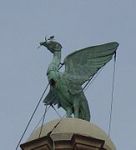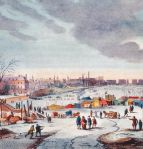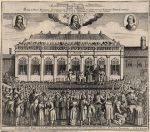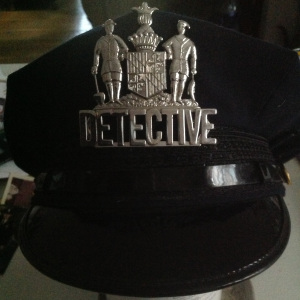I’ve shamefully neglected my blog, mainly because I tend to hibernate during January, huddling indoors and wishing I was somewhere warm; I only emerge when I need to go shopping for food. Last January though, we went to Liverpool for what I insisted on calling a romantic weekend though the Resident Engineer said it was a research trip to the archive of the Maritime Museum to check out a 1950s circuit diagram for an electric pump made by a long-defunct company. I went along for the ride but he does this kind of thing for fun and this was to do with one of the charities he volunteers for – in this case the Edwardian waterworks. (Photo Liver Bird, Wikipaedia)
 I’d only been to Liverpool once, back in the 70s when we had two small children and the Engineer did a six month stint of working during the week in Liverpool. In the summer holidays his boss suggested we should all go – I think it was his idea of a reward for me for not making a fuss! I don’t remember much about it but I do remember hauling a 5 year old and a 3 year old round Speke Hall because I still hadn’t cottoned on to the fact that a passion for old houses doesn’t gel with having small children. The Safari Park was a better bet.
I’d only been to Liverpool once, back in the 70s when we had two small children and the Engineer did a six month stint of working during the week in Liverpool. In the summer holidays his boss suggested we should all go – I think it was his idea of a reward for me for not making a fuss! I don’t remember much about it but I do remember hauling a 5 year old and a 3 year old round Speke Hall because I still hadn’t cottoned on to the fact that a passion for old houses doesn’t gel with having small children. The Safari Park was a better bet.
Last year’s trip was great. Our hotel was a monument to decayed grandeur. Our room was 30’ long by 20’ wide (I measured it) with an imposing fireplace and walls painted in the pink of old ladies’ corsets, picked out with gold twiddly bits. There was a huge radiator that only came on for a couple of hours in the early evening and the bathroom was large and chilly, with an avocado bath and with green Formica surrounding the wash-basin. There was no heating in there and you could perch frostily on the loo and hear the wind howling through the secondary glazing. However, I loved the place and the food was excellent. Liverpool was lovely too, and I completely fell for the Maritime Museum so we had coffee and lunch there before doing the Ferry Cross the Mersey. Guess what tune they played on a continuous loop? (Photo: Mersey ferry, Wikipaedia)
To take my mind off winter weather I’ve been checking out the kind of weather our ancestors had to endure, courtesy of http://booty.org.uk/booty.weather/climate/wxevents.htm (A brilliant site.)
AD341: Britain: SNOW – up to 15 feet deep lay 6 weeks.
AD1149/50: Severe winter: the first authentic report of the Thames being frozen solid – the frost lasted from December to March and the frozen river was crossed on foot and on horseback. Very intense cold began 10th December 1149 and continued until (at least) February 19th 1150.The Thames was frozen over at London Bridge and supported loaded wagons. (Pic. this later frost fair in the 1680s. Wiki pic)
AD1564/65: Severe, prolonged frost (set in 7th December 1564). The court of Elizabeth I indulged in sports on the ice at Westminster. Football & other games were also played on the ice. (In the depths of the Little Ice Age, this would not have been too unusual; the reason the event is noted is because the Queen & Court were involved: it would have been an impressive sight!) Pic: Queen Elizabeth too busy at her coronation to think about skating. Wiki
1946/47 – in living memory this one: ‘Mean temperature below 0 degC for 9 weeks. Bulldozers were diverted from bomb clearance to snow clearance. Ice-breakers had to be used in the River Medway & ice floes were reported in the lower Thames & its Estuary. There were severe losses to agriculture; 2 million sheep died, and the frosts destroyed much of the late potato crop. The aftermath was equally severe, with widespread burst pipes, local flooding as snow melted: winter of extreme misery.’
And now for something not actually very different at all…
Eye witness weather history comes from ‘Small Talk at Wreyland’ 1st ed 1918, by Cecil Torr who quotes from his father’s Victorian diaries. (Wreyland is in Devonshire).
‘Like many others of his time my grandfather was certain that the climate had improved and he thought he saw the cause. He writes to my father on 9th March 1845: Until within the last twenty years our winters were much colder than since, but I never knew such hard freezing as this.’
22nd December 1850 attributing the mild weather to ‘the better stage of cultivation of the land draining off the cold stagnant waters that lay about in all directions in my youth.’
‘2nd February 1851: ‘Not a flake of snow fell on the Forest of Dartmoor in the month of January, not the oldest man living on the Moor recollects the like before.’
‘2nd March 1862: The old people say there never was a February without snow.
Finally, some more (almost) eye-witness testimony for history buffs. Cecil Torr (1857-1928) says his father took him as a child to call on a very old man who ‘gave me an account of the beheading of King Charles I as he heard it from somebody who was an eye-witness.’ (Engraving: Charles I execution. Wikipaedia)
Another time young Cecil visited yet another elderly gent ‘whose great-aunt was told by an elderly lady that she had witnessed the Fire of London when she was about ten years old.’ (Pic: Great Fire of London, Wikipaedia)
The past may be another country but most years you’d need your hat, scarf, gloves and wellies to go there.
Advertisements Share this:




